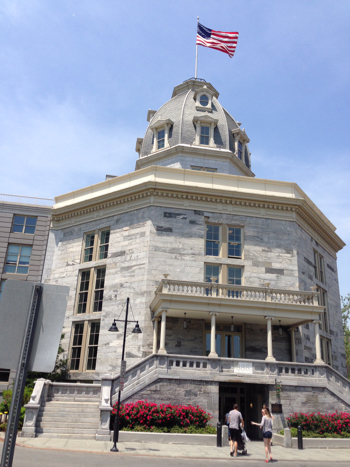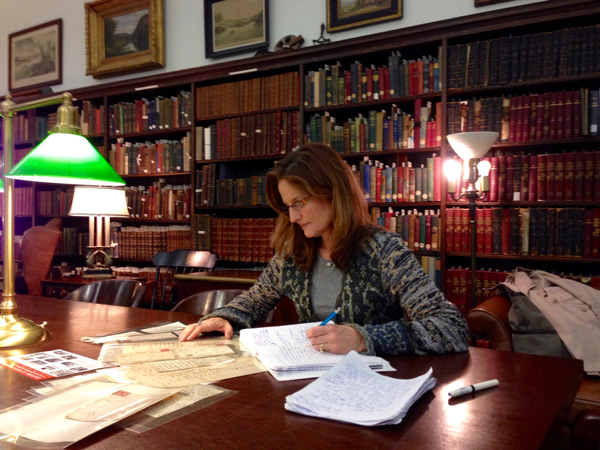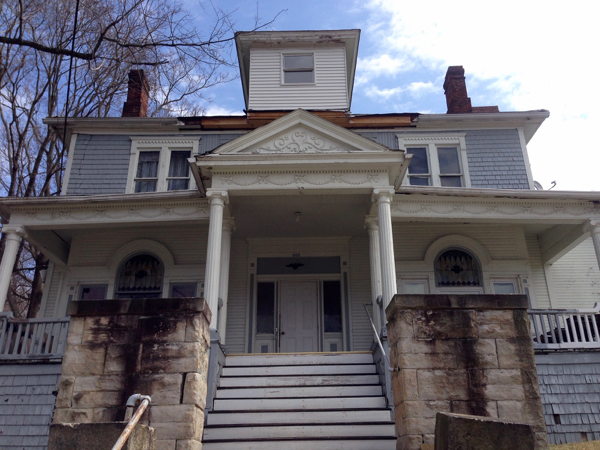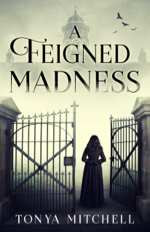Writing is a solitary endeavor.
Whether we, as writers, are in a bustling coffeeshop or sitting solo at the kitchen table, we are alone in it, submerging ourselves in a world of our own making.
We choose our words with care, and then we backspace and type different ones, only to backspace those and start all over again.
At times, it’s like giving blood, so meticulously are our sentences drawn, so painful the extraction of ideas from the depths within us. We steep ourselves in themes and characters and scenes and dialog no one sees until the work is complete and ready for consumption. If it is consumed. Getting published these days is often harder than the writing itself. But that’s another story.
Self-Doubt Loomed Like a Black-Robed Grim Reaper
Through the process of writing my debut novel, A Feigned Madness, self-doubt loomed like a black-robed grim reaper.
The true story of a young woman reporter who feigned insanity to go undercover in an insane asylum in 1887 seemed to me to have market appeal, but could I write the novel? Was I good enough?
While it may be true that doubt kills more dreams than failure ever will, it didn’t make my success through perseverance any more believable. Even when I worked my tail off into the wee hours of the night (for several years as it turned out), there was no guarantee that rejections from agents, editors, and publishers wouldn’t eventually come.
Sadly, hard work doesn’t always equal publishing success.
Even so, I have a post-it in my office that reads: Proceed as if success is inevitable.
Success isn’t always inevitable. I knew this. Yet the only way I could keep moving forward—whether it was finishing a chapter, or finding the odd research tidbit—was to ignore the grim reaper. And so I kept my head down. I did the work. I wrote the thing.
Had I focused on the end game—the published novel—and everything I had to do to get there, I would have been too overwhelmed to keep going. So, I focused on the next step instead and that didn’t seem so insurmountable.

Writers Need to Cultivate “Undesk” Time
I had other coping mechanisms too, and I suspect mine weren’t much different than other writers.
I had “undesk” time: walking the dog, cooking, spending time with family, gabbing with girlfriends, retail therapy, reading (pleasure of pleasures for me. Stick me in a room with a hundred interesting strangers, and I’d still rather be reading a book).
I’m often asked about my writing process. Truth is, I don’t have one.
In the case of my novel and the short stories I’ve written, I started thinking about the story first. While driving, making dinner, showering. Any cruise-control activity that freed my mind up to think.
I jotted ideas down. I did some research. I wrote a little, I edited a lot, and I kept doing that until I felt like the story was as good as I could make it. The story didn’t always reveal itself to me. I had to coax it out. Or maybe it was the writing itself that I was trying to coax.
Even when I know writing, difficult as it is, is what I’m meant to do, it’s just as important for me to recognize when I shouldn’t be doing it. Sometimes the best thing I can do for the sake of my sanity is take a nap. Write out a grocery list. Binge watch a Netflix show. Just be.
It’s not always about the word count and ticking writerly to dos off the list. It’s okay to disconnect from the work, to fill up the well that writing often drains. The beauty is that once the well is full again, I’m often brimming with ideas. Oftentimes whatever was stumping me will have worked itself out just by virtue of letting it go for a bit. I’m re-energized, and when I’m back in the chair again, I’m ready to work.
It’s Hard to Become a Master at Anything When You Treat it As a Hobby
But taking time away is a tricky thing. There’s a difference between the need to re-energize and when I’m just avoiding the difficult parts. This is when writing manager me has a serious talk with creative me.
If I’m just dodging conflict (I don’t know how to end this chapter! Is this the best place to add backstory?) I try not to allow myself time off. I’ve learned that I’ve got to write even when I don’t want to, even when it’s more toil than fun. If I wait for the writing muse to strike, my output is sporadic at best.
It’s hard to become a master at anything when you treat it as a hobby.
We Owe It To Our Readers to Get the History Right
And speaking of mastery, in writing historical fiction, we can’t be hobbyists when it comes to tackling research.
Readers are smart. We owe it to them to get history and our characters right.
Sometimes the research was dry when I was digging through biographies, old documents, maps, etc. when I was writing Madness. But in the end, all that research put meat on the bones of the characters I was writing about.
There were scenes where I stuck to the historical record, and a few, particularly at the end, where I decided to divert a little. In the case of the latter, I represented the protagonist, Nellie Bly, behaving the way she would have if presented with the circumstances in which I had placed her. I remained true to her inner nature.
As I wrote, I would often imagine her looking over my shoulder. I wanted to make her proud by presenting her as realistically and authentically as I could.

There’s No Substitute for Seeing Your Settings Firsthand
While I didn’t do all the research up front for Madness, I did about 80% of it before I started. That way, I had a good understanding of what happened and how and where I planned to portray it in the story. This included boning up on the story’s setting.
I took a trip to Apollo and Pittsburgh, Pennsylvania, where Nellie grew up and began her first job as a reporter, respectively. The Carnegie Library in Pittsburgh was especially helpful in allowing me to view letters she had penned over a hundred years ago.
I also went to New York City to visit places that show up in the book: Central Park, Bellevue Hospital, Blackwell’s Island (now Roosevelt Island). The octagonal tower of the insane asylum is still standing!
There’s no substitute for seeing these things firsthand if you can manage it. All these details, big and small, were key to immersing the reader in the period of the novel (late 1880s).

Advice for a Young Writer: Start Now
If I could give advice to a young person with writing aspirations (or to my younger self), it would be this: Start now. Don’t wait until life is perfect to start writing. Don’t wait until you’re “smart enough” or “experienced enough” to begin. Getting smart comes as you’re writing, just as experience comes with the work itself.
Give yourself permission to make mistakes. And keep at it no matter what. It’s almost always easier to blow off writing and do something else, something diverting that doesn’t require mental work. Looking back, those choices were rarely better for me and were never as fulfilling as just sitting down and writing.
I’ve often wondered, on the days when it seems the words just won’t come, why I stick with it. Why keep plodding? Does the world really need another short story? Another novel?
The simple answer: there’s nothing else that gives me the kind of joy that writing does. So the crappy days are worth it, because the good ones are divine.
* * *
Ever since reading Jane Eyre in high school, Tonya Mitchell has been drawn to dark stories of the gothic variety. Her influences include Mary Shelley, Edgar Allan Poe, and Bram Stoker. More contemporarily, she loves the work of Agatha Christie, Margaret Atwood, and Laura Purcell.
When she landed on a story about a woman who feigned insanity in order to go undercover in an insane asylum, she knew she’d landed on something she was meant to write. Her short fiction has appeared in, among other publications, Glimmer and Other Stories and Poems, for which she won the Cinnamon Press award in fiction.
She is a self-professed Anglophile and is obsessed with all things relating to the Victorian period. She is a member of the Historical Novel Society North America and resides in Cincinnati, Ohio with her husband and three wildly energetic sons. A Feigned Madness is her first novel.
For more on Tonya and her work, please see her website and connect with her on Facebook, Twitter, and Instagram.
 A Feigned Madness: Elizabeth Cochrane has a secret. She isn’t the madwoman with amnesia the doctors and inmates at Blackwell’s Asylum think she is.
A Feigned Madness: Elizabeth Cochrane has a secret. She isn’t the madwoman with amnesia the doctors and inmates at Blackwell’s Asylum think she is.
In truth, she’s working undercover for the New York World. When the managing editor refuses to hire her because she’s a woman, Elizabeth strikes a deal: in exchange for a job, she’ll impersonate a lunatic to expose a local asylum’s abuses.
When she arrives at the asylum, Elizabeth realizes she must make a decision—is she there merely to bear witness, or to intervene on behalf of the abused inmates? Can she interfere without blowing her cover? As the superintendent of the asylum grows increasingly suspicious, Elizabeth knows her scheme—and her dream of becoming a journalist in New York—is in jeopardy.
A Feigned Madness is a meticulously researched, fictionalized account of the woman who would come to be known as daredevil reporter Nellie Bly. At a time of cutthroat journalism, when newspapers battled for readers at any cost, Bly emerged as one of the first to break through the gender barrier—a woman who would, through her daring exploits, forge a trail for women fighting for their place in the world.
Available on Amazon or from Cynren Press.

